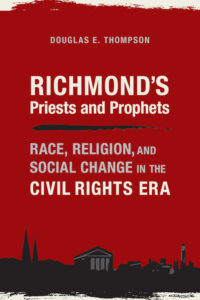 Race, Religion, and Social Change in the Civil Rights Era
Race, Religion, and Social Change in the Civil Rights Era
In the wake of the mid-twentieth century’s desegregation period, escalated turbulence and tension among political, social, and spiritual groups were commonplace, notably in the American south. In Richmond’s Priests and Prophets, author Douglas E. Thompson investigates the role white Christian leaders played in the shifting landscape of their congregations and communities amidst civil rights efforts in Richmond, Virginia. Faced with the decision to resist or assist the new racial narrative, these religious leaders are revealed to have adopted priestly and prophetic roles. Through a fresh analysis of the various desegregation strategies and patterns of the era, Thompson offers a timely and significant insight into one of the most pivotal American movements.
In an interview from John Fea’s “Author Corner,” Thompson explains the book’s formation:
“When I had begun the research in the late 1990s there was little scholarship on how white Christians engaged the civil rights movement. In the nearly fifteen years since then, there are more monographs about white Christians but many of those focus on what Charles Marsh and Stephen Haynes call the spectacles of the 1960s. When I began my research on Richmond in the 1990s, I was surprised at how few spectacles occurred. I reframed the book to examine why there had not been spectacles in the 1950s when the pressure points over desegregation were present. In the book I argue that we might understand the 1960s by studying the 1950s closer…
Outside the glare of the 1960s spectacles of marches, kneel-ins, and sit-ins Richmond’s ministers and congregations provide a compelling story about how white Christians wrestled with social change. Their variety of responses shed light on Christianity as an agent of change in social movements.”
For more information on the book click here. Continue reading Fea’s interview with Thompson here.
Fellow travelers are scholars, activists, and practitioners that embody the ideals and commitments of the Project on Lived Theology. We admire their work and are grateful to be walking alongside them in the development and dissemination of Lived Theology.
